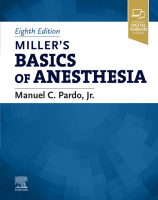Physical Address
304 North Cardinal St.
Dorchester Center, MA 02124

BASIC PHARMACOLOGY Structure and Activity Opioids play an indispensable role in the practice of anesthesiology, critical care, and pain management. A sound understanding of opioid pharmacology, including both basic science and clinical aspects, is critical for the safe and effective…

WHY INTRAVENOUS ANESTHETICS? Intravenous (IV) anesthetics are fundamental tools in the daily practice of modern anesthesia ( Box 8.1 ). One or more IV anesthetics will be administered in essentially any clinical encounter where a provider delivers anesthesia or sedation,…

HISTORY Before the introduction of anesthesia, surgery was usually excruciating and harrowing for patients, limited in duration and technique by what the patient could tolerate. On October 16, 1846, the dentist William T. G. Morton administered diethyl ether for a…

ANATOMY OF THE AUTONOMIC NERVOUS SYSTEM The Sympathetic Nervous System The autonomic nervous system (ANS) controls involuntary activities of the body outside consciousness. It is at once the most primitive and among the most essential of control systems—primitive in that…

When it comes to direct, integrated, daily management of cardiac and pulmonary physiology, no specialty compares with anesthesiology. A sound understanding of the separate and integrated fundamentals of cardiorespiratory physiology is essential for an anesthesia provider to rapidly manage both…

The basic principles of pharmacology are a fundamental element of an anesthesia provider's knowledge base. This chapter provides an overview of key principles in clinical pharmacology used to describe anesthetic drug behavior. Box 4.1 lists definitions of some basic pharmacologic…

Clinician well-being has emerged as a critical issue because of widespread clinician burnout. There is growing recognition that a combination of individual strategies and systems-level solutions is required to successfully promote clinician well-being. Interventions to prevent burnout are more effective…

The challenges of learning perioperative anesthesia care have grown considerably as the specialty has evolved. The beginning anesthesia trainee is faced with an ever-increasing quantity of literature and the need for increased knowledge and adequate patient care experiences. Healthcare systems…

. Surgery preceded the development of anesthesia as a medical specialty, with significant implications. Surgery has been performed for thousands of years. Archaeologists have discovered human skulls from prehistoric times with evidence of trephination, a surgical procedure involving drilling or…